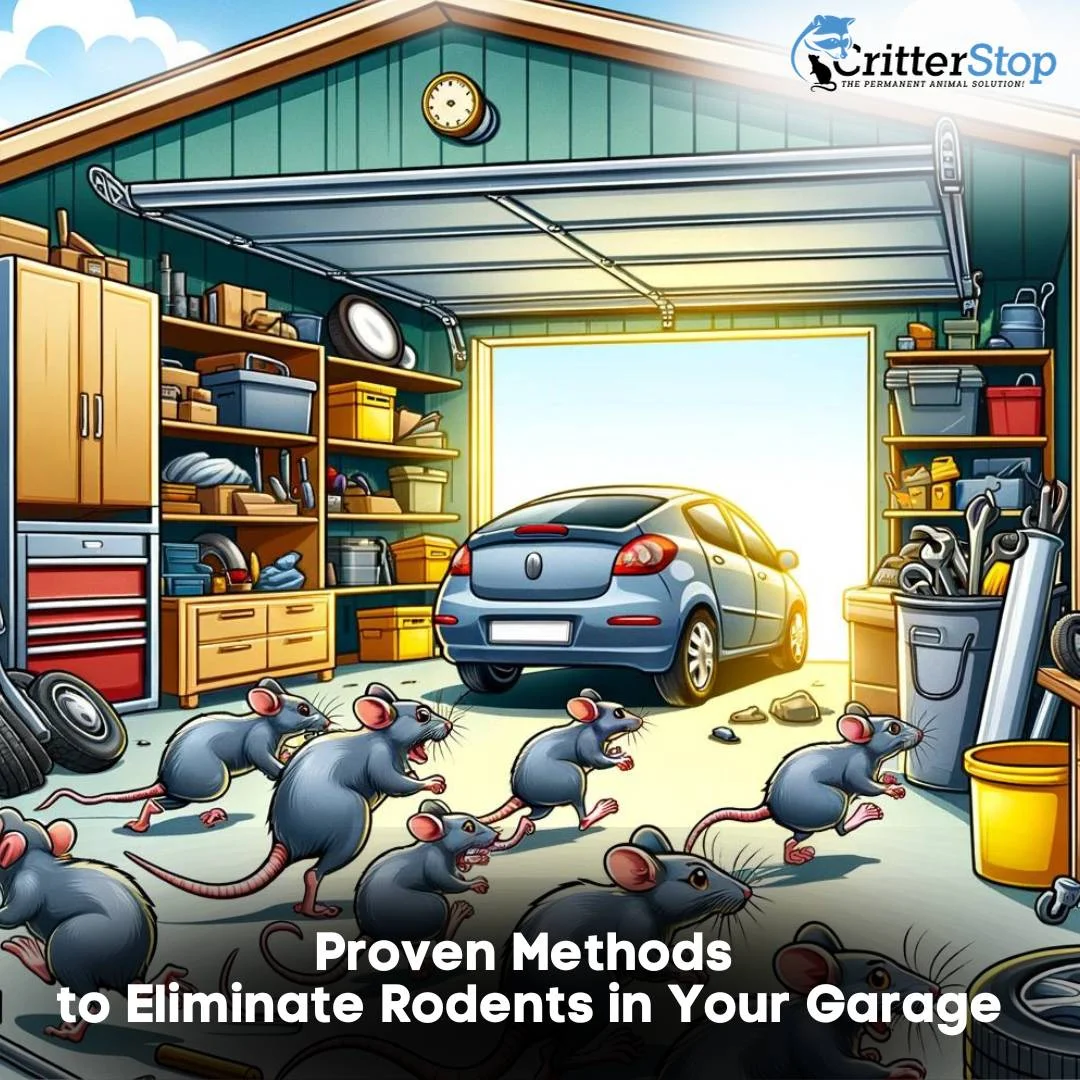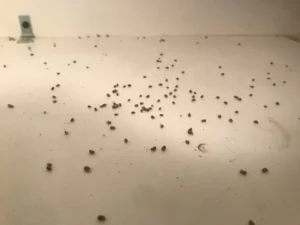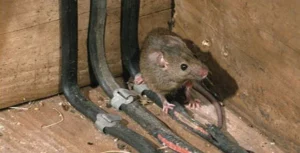
As the presence of rodents in your garage can be both a nuisance and a health hazard, it is essential to implement effective strategies for rodent control. By taking proactive measures and addressing the issue promptly, you can ensure the safety of your home and family. In this article, we will explore natural ways to keep rodents away from your home, discuss the signs of a rodent infestation you shouldn't ignore, and shed light on the health risks associated with such infestations. Additionally, we will introduce professional rodent removal services available in Ft. Worth and highlight how Critter Stop can safely and efficiently eliminate rodents from your property.

When it comes to rodent control, prevention is key. By implementing these methods, you can mitigate the risk of rodents finding their way into your garage:
Implementing effective strategies for rodent control is crucial to maintaining a rodent-free environment. However, it is important to note that rodents are highly adaptable creatures and can find their way into even the most well-protected areas. Therefore, it is essential to be vigilant and proactive in your approach to rodent prevention.
One additional method to consider is the use of traps. Traps can be an effective way to catch and remove rodents from your garage. There are various types of traps available, including snap traps, glue traps, and live traps. It is important to choose the appropriate trap for your specific situation and to follow the instructions carefully to ensure the safe and humane capture of rodents.
Furthermore, it is beneficial to understand the behavior and habits of rodents. By gaining insight into their preferences and tendencies, you can better tailor your prevention methods. For example, rodents are known to be excellent climbers, so it is important to inspect and secure any potential entry points on higher levels of your garage, such as windows or vents.
Many natural methods can help deter rodents from your property:
These natural methods can be effective in deterring rodents from your property without the use of harmful chemicals or pesticides. However, it is important to note that while these methods may help prevent rodent infestations, they may not completely eliminate the risk. It is still crucial to implement other preventive measures and to regularly inspect your garage for any signs of rodent activity.
It's important to be aware of the common signs of a rodent infestation:

Identifying the signs of a rodent infestation early on is crucial in preventing further damage and potential health risks. If you notice any of these signs in your garage, it is important to take immediate action to address the issue. Ignoring a rodent infestation can lead to extensive damage to your property and pose health risks, as rodents are known carriers of various diseases.
In conclusion, implementing effective rodent control strategies, utilizing natural deterrents, and being vigilant about the signs of a rodent infestation are essential in maintaining a rodent-free environment. By taking proactive measures and staying informed, you can protect your garage and property from the potential damage and health risks associated with rodent infestations.
Rodents can pose significant health risks when they infest your garage:

Rodents are known carriers of various diseases that can have severe consequences for human health:
When it comes to rodent infestations, the health risks extend beyond the diseases mentioned above. Rodents, such as rats and mice, are known to carry a wide range of pathogens that can be harmful to humans. These pathogens can be transmitted through direct contact with the rodents themselves, their droppings, urine, or even their bites.
One of the most concerning diseases associated with rodents is hantavirus. This virus can be found in the droppings, urine, and saliva of infected rodents. When humans come into contact with these contaminated materials, they can contract Hantavirus Pulmonary Syndrome (HPS), a potentially fatal respiratory illness. The symptoms of HPS can be severe, including fever, muscle aches, coughing, and shortness of breath. In some cases, HPS can lead to respiratory failure, requiring intensive medical care.
In addition to hantavirus, rodents can also spread salmonella, a bacteria known for causing severe gastrointestinal illness. If rodents contaminate food or surfaces with their droppings, the risk of salmonella infection increases significantly. Symptoms of salmonella poisoning include diarrhea, abdominal pain, fever, and vomiting. In severe cases, hospitalization may be required to manage dehydration and other complications.
Another disease transmitted by rodents is leptospirosis. This bacterial infection is commonly found in the urine of infected rodents and can contaminate water or soil. When humans come into contact with these contaminated sources, they can develop leptospirosis. The symptoms of leptospirosis can vary from mild to severe, ranging from flu-like symptoms such as fever and headache to more severe manifestations, including liver and kidney damage. In some cases, leptospirosis can be life-threatening if not promptly diagnosed and treated.
While rare, cases of plague can still occur in areas with rodent populations. Plague is caused by the bacterium Yersinia pestis and is primarily transmitted through fleas that infest rodents. When humans are bitten by infected fleas or come into contact with the bodily fluids of infected rodents, they can develop plague. The symptoms of plague can be severe and include fever, chills, weakness, and swollen lymph nodes. If left untreated, plague can lead to serious complications and even death.
Aside from the direct health risks associated with rodent infestations, there are other concerns to consider. Rodents have a habit of gnawing on various materials, including wires and wood. This behavior can lead to structural damage in your garage, compromising its integrity and potentially causing costly repairs. Additionally, chewed wires pose a significant fire hazard. The exposed electrical wiring increases the risk of electrical fires, putting your property and safety at risk.
It is crucial to address rodent infestations promptly to mitigate the health risks they pose. Taking preventive measures, such as sealing entry points, removing potential food sources, and maintaining cleanliness, can help prevent infestations in the first place. If an infestation is already present, seeking professional pest control services is recommended to ensure effective and safe removal of rodents from your garage.
If you're facing a persistent rodent infestation in your garage, seeking professional help is crucial. In Ft. Worth, Critter Stop offers reliable and effective rodent removal services. Their team of experts is equipped with the knowledge and tools necessary to safely and efficiently eliminate rodents from your property.
Critter Stop follows a comprehensive approach to rodent removal, focusing on:
By employing professional rodent removal services, you can effectively eliminate the infestation and gain peace of mind.
When faced with a rodent infestation in your garage, it's essential to take immediate action. By implementing proven methods of rodent control, such as sealing entry points, keeping your garage clean, and storing food properly, you can prevent rodents from invading your space. Additionally, utilizing natural deterrents and recognizing the signs of an infestation will help you address the problem promptly. Understanding the health risks associated with rodent infestations, including their potential to spread diseases and cause structural damage, emphasizes the importance of taking preventive measures and seeking professional help when needed. Critter Stop in Ft. Worth offers reliable rodent removal services, ensuring the safe and efficient elimination of rodents from your property. By prioritizing rodent control, you can maintain a clean, safe, and rodent-free garage for years to come.